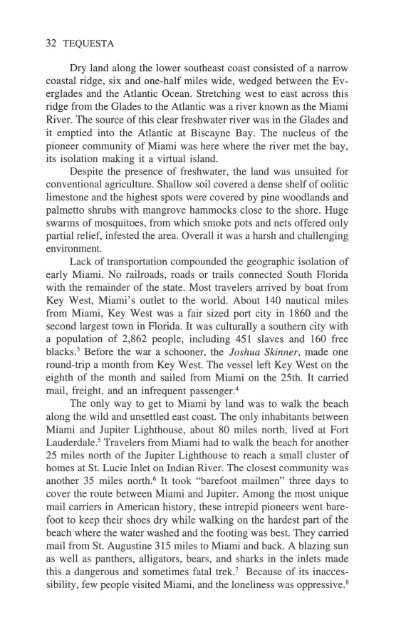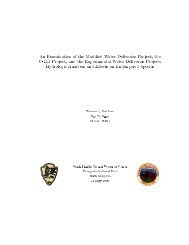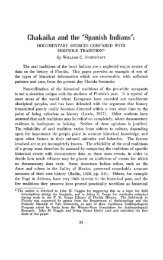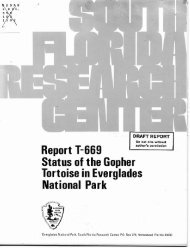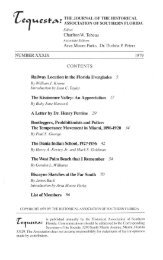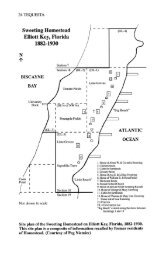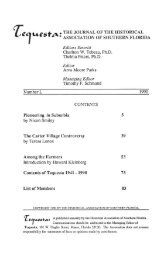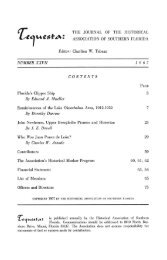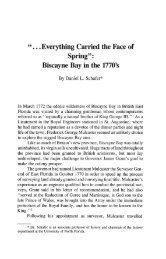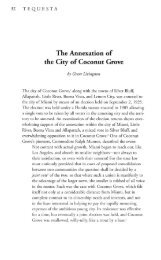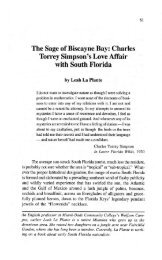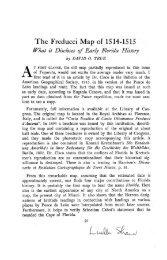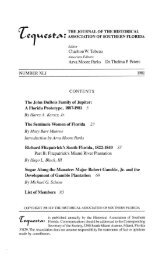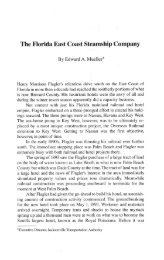Miami During the Civil War - FIU Digital Collections
Miami During the Civil War - FIU Digital Collections
Miami During the Civil War - FIU Digital Collections
You also want an ePaper? Increase the reach of your titles
YUMPU automatically turns print PDFs into web optimized ePapers that Google loves.
32 TEQUESTA<br />
Dry land along <strong>the</strong> lower sou<strong>the</strong>ast coast consisted of a narrow<br />
coastal ridge, six and one-half miles wide, wedged between <strong>the</strong> Everglades<br />
and <strong>the</strong> Atlantic Ocean. Stretching west to east across this<br />
ridge from <strong>the</strong> Glades to <strong>the</strong> Atlantic was a river known as <strong>the</strong> <strong>Miami</strong><br />
River. The source of this clear freshwater river was in <strong>the</strong> Glades and<br />
it emptied into <strong>the</strong> Atlantic at Biscayne Bay. The nucleus of <strong>the</strong><br />
pioneer community of <strong>Miami</strong> was here where <strong>the</strong> river met <strong>the</strong> bay,<br />
its isolation making it a virtual island.<br />
Despite <strong>the</strong> presence of freshwater, <strong>the</strong> land was unsuited for<br />
conventional agriculture. Shallow soil covered a dense shelf of oolitic<br />
limestone and <strong>the</strong> highest spots were covered by pine woodlands and<br />
palmetto shrubs with mangrove hammocks close to <strong>the</strong> shore. Huge<br />
swarms of mosquitoes, from which smoke pots and nets offered only<br />
partial relief, infested <strong>the</strong> area. Overall it was a harsh and challenging<br />
environment.<br />
Lack of transportation compounded <strong>the</strong> geographic isolation of<br />
early <strong>Miami</strong>. No railroads, roads or trails connected South Florida<br />
with <strong>the</strong> remainder of <strong>the</strong> state. Most travelers arrived by boat from<br />
Key West, <strong>Miami</strong>'s outlet to <strong>the</strong> world. About 140 nautical miles<br />
from <strong>Miami</strong>, Key West was a fair sized port city in 1860 and <strong>the</strong><br />
second largest town in Florida. It was culturally a sou<strong>the</strong>rn city with<br />
a population of 2,862 people, including 451 slaves and 160 free<br />
blacks. 3 Before <strong>the</strong> war a schooner, <strong>the</strong> Joshua Skinner, made one<br />
round-trip a month from Key West. The vessel left Key West on <strong>the</strong><br />
eighth of <strong>the</strong> month and sailed from <strong>Miami</strong> on <strong>the</strong> 25th. It carried<br />
mail, freight, and an infrequent passenger. 4<br />
The only way to get to <strong>Miami</strong> by land was to walk <strong>the</strong> beach<br />
along <strong>the</strong> wild and unsettled east coast. The only inhabitants between<br />
<strong>Miami</strong> and Jupiter Lighthouse, about 80 miles north, lived at Fort<br />
Lauderdale. 5 Travelers from <strong>Miami</strong> had to walk <strong>the</strong> beach for ano<strong>the</strong>r<br />
25 miles north of <strong>the</strong> Jupiter Lighthouse to reach a small cluster of<br />
homes at St. Lucie Inlet on Indian River. The closest community was<br />
ano<strong>the</strong>r 35 miles north. 6 It took "barefoot mailmen" three days to<br />
cover <strong>the</strong> route between <strong>Miami</strong> and Jupiter. Among <strong>the</strong> most unique<br />
mail carriers in American history, <strong>the</strong>se intrepid pioneers went barefoot<br />
to keep <strong>the</strong>ir shoes dry while walking on <strong>the</strong> hardest part of <strong>the</strong><br />
beach where <strong>the</strong> water washed and <strong>the</strong> footing was best. They carried<br />
mail from St. Augustine 315 miles to <strong>Miami</strong> and back. A blazing sun<br />
as well as pan<strong>the</strong>rs, alligators, bears, and sharks in <strong>the</strong> inlets made<br />
this a dangerous and sometimes fatal trek. 7 Because of its inaccessibility,<br />
few people visited <strong>Miami</strong>, and <strong>the</strong> loneliness was oppressive. 8


